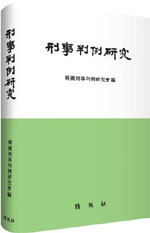- 영문명
- 발행기관
- 한국형사판례연구회
- 저자명
- 박진환
- 간행물 정보
- 『형사판례연구』형사판례연구 제19권, 138~175쪽, 전체 38쪽
- 주제분류
- 법학 > 법학
- 파일형태
- 발행일자
- 2011.06.30

국문 초록
영문 초록
The aim of this paper is to examine the Supreme Court Decision 2009Do7681 decided December 10. The victimized spouse A accused 甲 and 乙 of adultery and in court, the spouse 甲 admitted that she committed adultery with 乙. They were sentenced to six months in prison with a stay of execution for one year but only she appealed the decision to a higher court. After sentence of the first instance, she was reunited with her former husband(the accuser A). But the appellate court dismissed her appeal. However, the Supreme Court decided that, if the accuser and the accused(spouse) of adultery reunite after sentence of the first instance, the complaint of adultery do not meet the valid requirements named ‘the dissolution of matrimonial relationship’, therefore, the court shall dismiss the public prosecution according to Paragraph 2(Where the procedure for instituting public prosecution is void by reason of its having been contrary to the provisions of Acts) of Article 327 of the Criminal Procedure Act. Nevertheless, the court below did not follow legal principles above, and the court dismissed the appeal. Therefore, the judgement of the court below shall be reversed for error in law regarding prosecution requirements, and the Supreme Court may render a direct judgment on the case according to Paragraph 1 of Article 396 of the Criminal Procedure Act. This Supreme Court ruling follows the precedent set by the Supreme Court Decision 75Do1449 decided June 24. The summary decision of this decision was as follows. When the divorce action is withdrawn or the accuser reunite with the accused again, the court shall dismiss the public prosecution according to Paragraph 2 of Article 327 of the Criminal Procedure Act. In adultery case, not only should a complaint be fulfilled from instituting public prosecution to terminating a criminal trial, but also the other valid prosecution requirements named ‘the dissolution of matrimonial relationship’ or ‘the pendency of a divorce action’ should be fulfilled from instituting public prosecution to terminating a criminal trial. It is covered in Paragraph 1, 2 of Article 229 of the Criminal Procedure Act. In cases where the divorce action is withdrawn or the accuser reunite with the accused again after sentence of the first instance, the Supreme Court don’t treat the withdrawal of the divorce action and the reunion as a withdrawal of a complaint. So, if the divorce action is withdrawn or the accuser reunite with the accused again after the sentence of the first instance, the public prosecution do not meet the valid requirements for prosecution of Paragraph 1 of Article 229 regardless of Paragraph 2 of Article 229 of the Criminal Procedure Act, and the procedure for instituting public prosecution is void by reason of its having been contrary to the provisions of Acts. Therefore the court shall dismiss the public prosecution according to Paragraph 2 of Article 327, not of Paragraph 5 of Article 327 of the Criminal Procedure Act. In conclusion, I am in favor of the Supreme Court opinion because the court’s decision do not hinder the accuser and the accused’s plan to reunite with and recover a domestic peace after a sentence of the first instance. This decision would be considered an important test case by both advocates and opponents of adultery.
목차
Ⅰ. 事案의 槪要
Ⅱ. 소송의 진행 경과
Ⅲ. 評釋
Ⅳ. 結論
키워드
간통죄
고소
이혼소송
소송요건
고소취소
공소제기
공소각하
소장각하
혼인관계
재결합
혼인신고
유효요건
협의이혼
배우자
이혼심판
취하
취하간주
adultery
complaint
divorce action
requirements for prosecution
revocation of complaint
public prosecution
dismissing public prosecution
dismissing the written complaint
matrimonial relationship
reunion
withdrawal
marriage registration
a divorce by agreement
spouse
해당간행물 수록 논문
참고문헌
최근 이용한 논문
교보eBook 첫 방문을 환영 합니다!

신규가입 혜택 지급이 완료 되었습니다.
바로 사용 가능한 교보e캐시 1,000원 (유효기간 7일)
지금 바로 교보eBook의 다양한 콘텐츠를 이용해 보세요!


